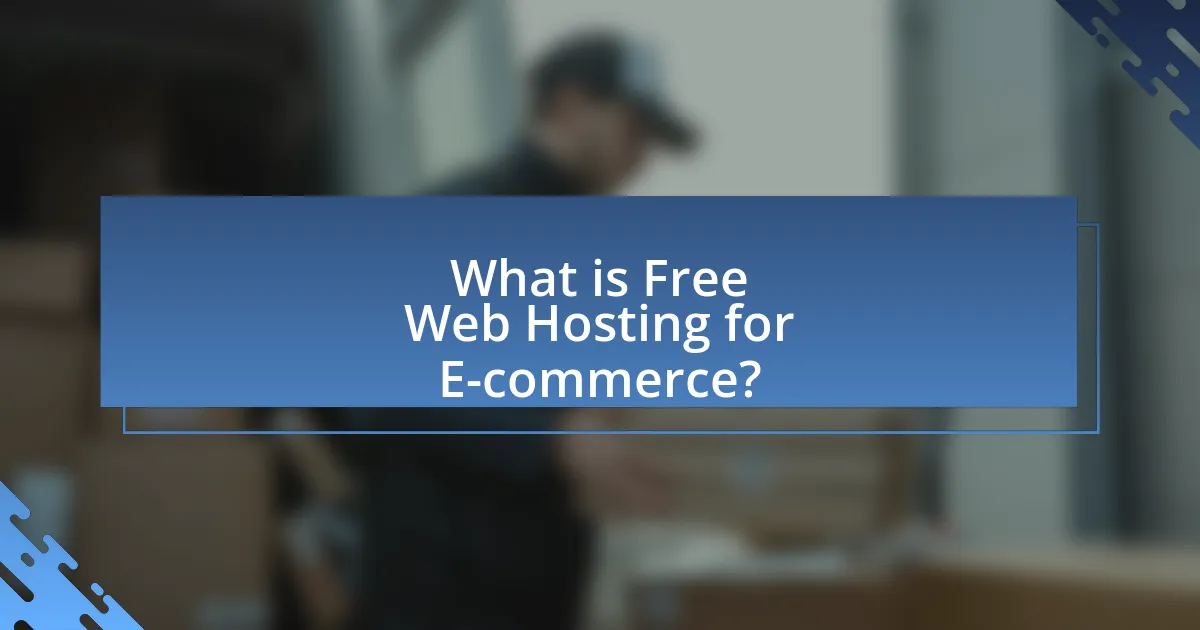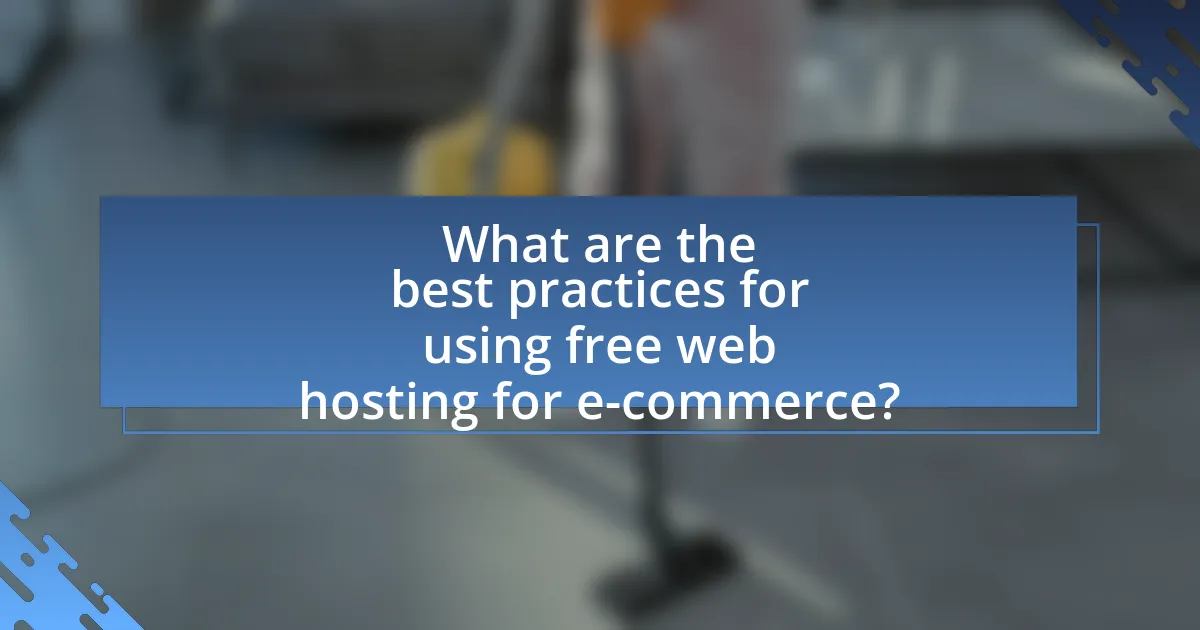Free web hosting for e-commerce provides businesses with the opportunity to create and manage online stores without incurring hosting fees. This article examines the differences between free and paid hosting options, highlighting the limitations of free services, such as restricted bandwidth, lack of security, and minimal customer support. It also discusses essential features for e-commerce websites, the impact of free hosting on performance, and the best practices for optimizing e-commerce sites on free platforms. Additionally, the article compares top free hosting platforms, evaluates their strengths and weaknesses, and offers guidance on transitioning to paid hosting when necessary.

What is Free Web Hosting for E-commerce?
Free web hosting for e-commerce refers to online services that allow businesses to create and manage their e-commerce websites without incurring hosting fees. These platforms typically provide essential features such as website builders, shopping cart functionality, and payment processing options, enabling users to set up online stores at no cost. Many free web hosting services may have limitations, such as bandwidth restrictions or ads on the site, but they serve as an accessible entry point for small businesses and startups looking to establish an online presence.
How does free web hosting differ from paid options?
Free web hosting differs from paid options primarily in terms of features, reliability, and support. Free hosting typically offers limited storage, bandwidth, and lacks essential features such as custom domain names, SSL certificates, and technical support, which are often included in paid plans. For example, many free hosting services display ads on user sites, while paid options provide an ad-free experience and greater control over the website’s branding. Additionally, paid hosting generally ensures better uptime and faster loading speeds, which are critical for e-commerce success, as studies show that a one-second delay in page load time can lead to a 7% reduction in conversions.
What are the limitations of free web hosting for e-commerce?
Free web hosting for e-commerce has several limitations that can hinder business operations. Firstly, free web hosting often lacks essential features such as a custom domain name, which can undermine brand credibility and trust among customers. Additionally, free hosting services typically impose bandwidth and storage limitations, restricting the amount of traffic and data that can be handled, which can lead to slow loading times and potential downtime during peak traffic periods. Security is another significant concern, as free hosting providers may not offer adequate protection against cyber threats, leaving sensitive customer information vulnerable. Furthermore, free web hosting often includes advertisements that can detract from the user experience and may not align with the brand image. Lastly, customer support is usually minimal or non-existent, making it difficult for e-commerce businesses to resolve issues promptly. These limitations collectively make free web hosting a less viable option for serious e-commerce ventures.
How can free web hosting impact e-commerce performance?
Free web hosting can negatively impact e-commerce performance by limiting website speed, reliability, and security. Websites hosted on free platforms often experience slower loading times due to shared resources, which can lead to higher bounce rates; studies show that a one-second delay in page load time can reduce conversions by 7%. Additionally, free hosting services may have frequent downtimes, affecting the availability of online stores and resulting in lost sales opportunities. Security is another concern, as free hosting often lacks robust security measures, making e-commerce sites more vulnerable to cyberattacks, which can compromise customer data and damage brand reputation.
What are the key features to look for in free web hosting?
Key features to look for in free web hosting include storage space, bandwidth, uptime reliability, customer support, and ease of use. Storage space is crucial as it determines how much data you can host, while bandwidth affects the amount of traffic your site can handle. Uptime reliability is essential for ensuring your website is accessible, with a minimum of 99.9% uptime being ideal. Customer support is important for resolving issues quickly, and ease of use ensures that even those without technical skills can manage their hosting effectively. These features collectively enhance the functionality and performance of a website hosted on a free platform.
Which features are essential for e-commerce websites?
Essential features for e-commerce websites include a user-friendly interface, secure payment processing, mobile responsiveness, product management tools, and customer support options. A user-friendly interface enhances navigation and improves the shopping experience, while secure payment processing ensures customer data protection, which is critical as 43% of consumers abandon transactions due to security concerns. Mobile responsiveness is vital, as mobile commerce accounted for 54% of total e-commerce sales in 2021. Product management tools allow for efficient inventory tracking and updates, and robust customer support options, such as live chat, can increase customer satisfaction and retention.
How do security features vary among free hosting platforms?
Security features among free hosting platforms vary significantly, impacting the level of protection offered to users. Some platforms provide basic security measures such as SSL certificates and limited DDoS protection, while others may include advanced features like automated backups, malware scanning, and firewalls. For instance, platforms like InfinityFree and 000webhost offer minimal security, lacking SSL by default, whereas services like WordPress.com include SSL and additional security plugins. The disparity in security features is often due to the business model of free hosting, which prioritizes cost savings over comprehensive security, leading to varying levels of vulnerability to cyber threats.
Why choose free web hosting for e-commerce?
Free web hosting for e-commerce is chosen primarily for its cost-effectiveness, allowing businesses to launch online stores without initial financial investment. This option is particularly beneficial for startups and small businesses that may have limited budgets. According to a report by Statista, 20% of small businesses cite cost as a major barrier to online presence, making free hosting an attractive solution. Additionally, many free hosting platforms offer essential features such as website builders, templates, and basic e-commerce functionalities, enabling users to create functional online stores without incurring expenses.
What are the potential cost savings for startups?
Startups can achieve significant cost savings by utilizing free web hosting services, which eliminate initial expenses associated with website setup. By opting for platforms that offer free hosting, startups can save on monthly fees that typically range from $5 to $50, depending on the provider. Additionally, these platforms often include essential features such as website builders, templates, and e-commerce tools at no extra cost, further reducing the need for additional investments in software or design services. For instance, platforms like Wix and WordPress.com provide free plans that allow startups to launch their online presence without upfront costs, enabling them to allocate their limited resources to other critical areas of their business.
How can free hosting help in testing e-commerce ideas?
Free hosting can significantly aid in testing e-commerce ideas by providing a cost-effective platform for entrepreneurs to launch and evaluate their concepts without financial risk. This allows businesses to gather real-time data on customer interactions, sales patterns, and website performance, which are critical for refining their offerings. For instance, platforms like WordPress and Wix offer free hosting options that enable users to create functional online stores, facilitating A/B testing and user feedback collection. By utilizing these free resources, startups can validate their business models and make informed decisions based on actual user engagement rather than assumptions.

What are the top platforms for free web hosting for e-commerce?
The top platforms for free web hosting for e-commerce include Wix, Weebly, and Shopify. Wix offers a user-friendly interface with customizable templates and e-commerce features, allowing users to set up online stores easily. Weebly provides drag-and-drop functionality and integrated e-commerce tools, making it suitable for small businesses. Shopify, while primarily a paid service, offers a free trial that allows users to explore its extensive e-commerce capabilities, including payment processing and inventory management. These platforms are recognized for their ease of use and essential features that support e-commerce activities.
What criteria should be used to compare these platforms?
To compare free web hosting platforms for e-commerce, the criteria should include storage capacity, bandwidth limits, uptime reliability, customer support, ease of use, scalability options, and available e-commerce features. Each of these criteria directly impacts the performance and functionality of an e-commerce site. For instance, storage capacity and bandwidth limits determine how much data can be hosted and how many visitors can be accommodated, which is crucial for online sales. Uptime reliability is essential for ensuring that the website is accessible to customers at all times, with a standard expectation of 99.9% uptime. Customer support is vital for resolving issues quickly, while ease of use affects how easily users can set up and manage their online stores. Scalability options are important for businesses that anticipate growth, allowing them to upgrade their hosting plans as needed. Lastly, specific e-commerce features, such as payment gateways and shopping cart functionality, are critical for facilitating transactions.
How do user reviews influence platform selection?
User reviews significantly influence platform selection by providing potential users with insights into the experiences of others, which can affect their decision-making process. Research indicates that 79% of consumers trust online reviews as much as personal recommendations, highlighting the importance of user feedback in shaping perceptions of e-commerce platforms. Positive reviews can enhance a platform’s credibility, while negative reviews can deter users, ultimately guiding their choice based on perceived reliability and user satisfaction.
What performance metrics are important for e-commerce?
Key performance metrics important for e-commerce include conversion rate, average order value, cart abandonment rate, customer acquisition cost, and customer lifetime value. Conversion rate measures the percentage of visitors who make a purchase, indicating the effectiveness of the sales funnel. Average order value reflects the average amount spent per transaction, helping to assess revenue potential. Cart abandonment rate tracks the percentage of shoppers who leave items in their cart without completing the purchase, highlighting potential issues in the checkout process. Customer acquisition cost calculates the expense incurred to acquire a new customer, essential for budgeting and marketing strategies. Customer lifetime value estimates the total revenue a business can expect from a customer over their entire relationship, guiding long-term business decisions. These metrics are critical for evaluating and optimizing e-commerce performance.
What are the strengths and weaknesses of each platform?
The strengths and weaknesses of each platform for free web hosting in e-commerce vary significantly. For example, WordPress.com offers extensive customization options and a large community for support, but it has limitations on e-commerce features unless upgraded to a paid plan. Wix provides an intuitive drag-and-drop interface and built-in e-commerce tools, yet it may lack scalability for larger businesses. Shopify, while not free but often included in comparisons, excels in e-commerce functionality and payment processing but can be costly for small businesses. Weebly is user-friendly and integrates well with Square for payments, but it has fewer design options compared to competitors. Each platform’s strengths cater to different user needs, while their weaknesses can hinder growth or functionality depending on the business model.
How does platform reliability affect e-commerce operations?
Platform reliability directly impacts e-commerce operations by ensuring consistent uptime and performance, which are critical for maintaining customer trust and satisfaction. When an e-commerce platform is reliable, it minimizes downtime, allowing customers to browse and purchase products without interruption. According to a study by the Aberdeen Group, a 1% increase in uptime can lead to a 7% increase in customer satisfaction and a corresponding increase in sales. Additionally, reliable platforms facilitate secure transactions and protect sensitive customer data, which is essential for compliance with regulations such as GDPR. Therefore, the reliability of an e-commerce platform is fundamental to operational efficiency, customer retention, and overall business success.
What unique features does each platform offer for e-commerce?
Shopify offers a unique feature of an integrated payment gateway, allowing merchants to accept payments directly without third-party services. WooCommerce provides extensive customization options through plugins, enabling users to tailor their online stores to specific needs. Wix stands out with its drag-and-drop interface, making it easy for users without technical skills to build e-commerce sites. BigCommerce features built-in SEO tools that help optimize online stores for search engines, enhancing visibility. Each platform’s unique features cater to different user requirements, facilitating diverse e-commerce experiences.
How do these platforms support e-commerce growth?
These platforms support e-commerce growth by providing essential tools and features that enhance online store functionality and visibility. For instance, they offer customizable templates, integrated payment gateways, and SEO optimization tools, which collectively streamline the process of setting up and managing an online store. According to a report by Statista, e-commerce sales worldwide reached 4.28 trillion USD in 2020, highlighting the importance of robust platforms in facilitating this growth. Additionally, features like analytics and marketing automation enable businesses to track performance and engage customers effectively, further driving sales and customer retention.
What scalability options are available with free hosting?
Free hosting typically offers limited scalability options, primarily due to resource constraints and restrictions on server performance. Users may experience challenges in upgrading their services, as many free hosting providers do not allow for easy transitions to higher-tier plans or additional resources. For instance, platforms like WordPress.com and Wix provide basic features for free but often require users to upgrade to paid plans for enhanced capabilities, such as increased storage, bandwidth, or custom domain support. This limitation is a common characteristic of free hosting services, which are designed to attract users but may not support significant growth or increased traffic effectively.
How can integrations with payment gateways enhance e-commerce?
Integrations with payment gateways enhance e-commerce by streamlining the transaction process, which increases conversion rates. When e-commerce platforms incorporate reliable payment gateways, they provide customers with a seamless checkout experience, reducing cart abandonment rates. For instance, studies show that 69.57% of online shoppers abandon their carts, often due to complicated payment processes. By offering multiple payment options and ensuring secure transactions, businesses can cater to diverse customer preferences and build trust. This ultimately leads to higher sales and customer satisfaction, as evidenced by a report from Statista indicating that 56% of consumers prefer to shop with retailers that offer their preferred payment methods.

What are the best practices for using free web hosting for e-commerce?
The best practices for using free web hosting for e-commerce include selecting a reliable provider, ensuring SSL certification, optimizing website speed, and maintaining regular backups. A reliable provider minimizes downtime and offers essential features like e-commerce support. SSL certification is crucial for securing customer data and building trust, as 85% of consumers will abandon a purchase if they feel their data is not secure. Optimizing website speed enhances user experience, with studies showing that a one-second delay can reduce conversions by 7%. Regular backups protect against data loss, ensuring business continuity. Following these practices can help mitigate the inherent risks associated with free web hosting while maximizing e-commerce potential.
How can you optimize your e-commerce site on a free hosting platform?
To optimize your e-commerce site on a free hosting platform, focus on improving site speed, enhancing user experience, and utilizing SEO best practices. Site speed can be improved by compressing images and minimizing code, which is crucial as studies show that a one-second delay in page load time can lead to a 7% reduction in conversions. Enhancing user experience involves creating a mobile-responsive design and simplifying navigation, as 79% of users who have trouble with a website are less likely to return. Implementing SEO best practices, such as using relevant keywords in product descriptions and optimizing meta tags, can increase visibility in search engines, leading to higher traffic and potential sales.
What strategies can improve site speed and performance?
To improve site speed and performance, optimizing images is essential, as large image files can significantly slow down loading times. Compressing images using tools like TinyPNG or ImageOptim can reduce file sizes without sacrificing quality, leading to faster page loads. Additionally, implementing browser caching allows frequently accessed resources to be stored locally on users’ devices, reducing load times on subsequent visits. According to Google, effective caching can improve site speed by up to 80%. Furthermore, minimizing HTTP requests by combining CSS and JavaScript files can streamline the loading process, as each request adds latency. A study by Akamai found that reducing the number of requests can decrease load times by 50%. Lastly, utilizing a Content Delivery Network (CDN) can distribute content across multiple servers globally, ensuring faster access for users regardless of their location, which can enhance performance significantly.
How can you enhance security on a free hosting platform?
To enhance security on a free hosting platform, implement strong password policies and enable two-factor authentication. Strong passwords reduce the risk of unauthorized access, while two-factor authentication adds an additional layer of security by requiring a second form of verification. According to a study by the Cybersecurity & Infrastructure Security Agency, using multi-factor authentication can block 99.9% of automated attacks. Regularly updating software and plugins also mitigates vulnerabilities, as outdated systems are prime targets for cyberattacks. Furthermore, utilizing secure protocols like HTTPS ensures data encryption during transmission, protecting sensitive information from interception.
What common pitfalls should be avoided when using free hosting?
Common pitfalls to avoid when using free hosting include limited bandwidth and storage, which can lead to website downtime during traffic spikes. Additionally, free hosting often lacks customer support, making it difficult to resolve issues promptly. Security vulnerabilities are also prevalent, as free hosts may not provide adequate protection against cyber threats. Furthermore, free hosting services frequently impose ads on websites, detracting from the user experience and brand image. Lastly, the lack of control over server configurations can hinder website performance and customization options.
How can you manage bandwidth limitations effectively?
To manage bandwidth limitations effectively, prioritize optimizing website content and implementing caching strategies. Optimizing content involves compressing images and minimizing file sizes, which reduces the amount of data transmitted. Caching strategies, such as using a Content Delivery Network (CDN), store copies of your website’s content closer to users, decreasing load times and bandwidth usage. According to a study by Akamai, using a CDN can reduce bandwidth consumption by up to 50%, demonstrating the effectiveness of these strategies in managing bandwidth limitations.
What are the risks of relying solely on free hosting for e-commerce?
Relying solely on free hosting for e-commerce poses significant risks, including limited bandwidth, lack of security, and potential downtime. Free hosting services often impose restrictions on data transfer, which can hinder website performance and user experience during high traffic periods. Additionally, these platforms typically lack robust security measures, making e-commerce sites vulnerable to data breaches and cyberattacks, as evidenced by the fact that 43% of cyberattacks target small businesses, many of which use free hosting. Furthermore, free hosting providers may experience frequent outages, leading to lost sales opportunities and damage to brand reputation. These factors collectively undermine the reliability and professionalism necessary for successful e-commerce operations.
What tips can help ensure a successful e-commerce experience on free hosting?
To ensure a successful e-commerce experience on free hosting, prioritize selecting a reliable platform that offers essential features such as SSL certificates, user-friendly interfaces, and adequate bandwidth. Reliable platforms like Wix and Shopify provide built-in security measures and easy-to-use templates, which enhance user experience and trust. Additionally, optimize your website for mobile devices, as over 50% of e-commerce traffic comes from mobile users, according to Statista. Regularly update your content and products to keep customers engaged and improve search engine rankings. Lastly, utilize social media and email marketing to drive traffic to your site, as these channels can significantly increase visibility and sales.
How can you leverage community support and resources?
You can leverage community support and resources by actively engaging with online forums, social media groups, and local meetups focused on e-commerce and web hosting. These platforms provide valuable insights, shared experiences, and recommendations from other users who have navigated similar challenges. For instance, participating in discussions on platforms like Reddit or specialized Facebook groups can yield practical advice on selecting the best free web hosting services tailored for e-commerce needs. Additionally, many hosting providers have dedicated community forums where users can ask questions and receive support from both the provider and fellow users, enhancing the overall experience and effectiveness of the chosen platform.
What are the best ways to transition to paid hosting when needed?
The best ways to transition to paid hosting when needed include evaluating your current hosting performance, selecting a suitable paid hosting provider, and migrating your website data. First, assess your current free hosting limitations, such as bandwidth, storage, and support, to determine the necessity for an upgrade. Next, research and choose a paid hosting provider that meets your specific needs, considering factors like scalability, uptime guarantees, and customer support. Finally, back up your website data and follow the migration process outlined by your new hosting provider, which typically includes transferring files, databases, and updating DNS settings. This structured approach ensures a smooth transition to a more robust hosting solution.


